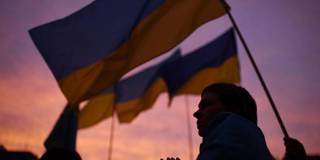Amid so much instability, one thing is clear 13 months after Russia’s full-scale invasion of Ukraine: the world order will not survive in its previous form, and Europe will have to adapt quickly. Even if cooperation eventually prevails, the European Union’s basic character will have changed.
BERLIN – Did Russian President Vladimir Putin know what he was doing when he ordered a full-scale invasion of Ukraine last February 24? That decision was a turning point for Europe. For the first time in eight decades, a great land war had erupted on the continent, shattering Europeans’ cherished illusions of peace with a force paralleling that of the Russian bombs that have been exploding in Ukrainian towns and villages ever since.
Putin apparently cannot conceive of Russia as anything other than a weaponized, feared, authoritarian world power. But achieving that status requires Russian hegemony in Eastern Europe – a revival of the imperial legacy of czarist Russia and the Soviet Union – for which Putin needed Ukraine. But he badly underestimated the Ukrainian willingness to fight and die for their freedom and independence. This, together with the support provided by NATO and the European Union, has prevented him from achieving his goal.
Three days after the invasion, German Chancellor Olaf Scholz captured the moment well in a speech to the German parliament. “We are living through a watershed era,” he declared. “And that means that the world afterwards will no longer be the same as the world before.” In fact, the war in Ukraine is about much more than most people – including Scholz – realized 13 months ago.

BERLIN – Did Russian President Vladimir Putin know what he was doing when he ordered a full-scale invasion of Ukraine last February 24? That decision was a turning point for Europe. For the first time in eight decades, a great land war had erupted on the continent, shattering Europeans’ cherished illusions of peace with a force paralleling that of the Russian bombs that have been exploding in Ukrainian towns and villages ever since.
Putin apparently cannot conceive of Russia as anything other than a weaponized, feared, authoritarian world power. But achieving that status requires Russian hegemony in Eastern Europe – a revival of the imperial legacy of czarist Russia and the Soviet Union – for which Putin needed Ukraine. But he badly underestimated the Ukrainian willingness to fight and die for their freedom and independence. This, together with the support provided by NATO and the European Union, has prevented him from achieving his goal.
Three days after the invasion, German Chancellor Olaf Scholz captured the moment well in a speech to the German parliament. “We are living through a watershed era,” he declared. “And that means that the world afterwards will no longer be the same as the world before.” In fact, the war in Ukraine is about much more than most people – including Scholz – realized 13 months ago.